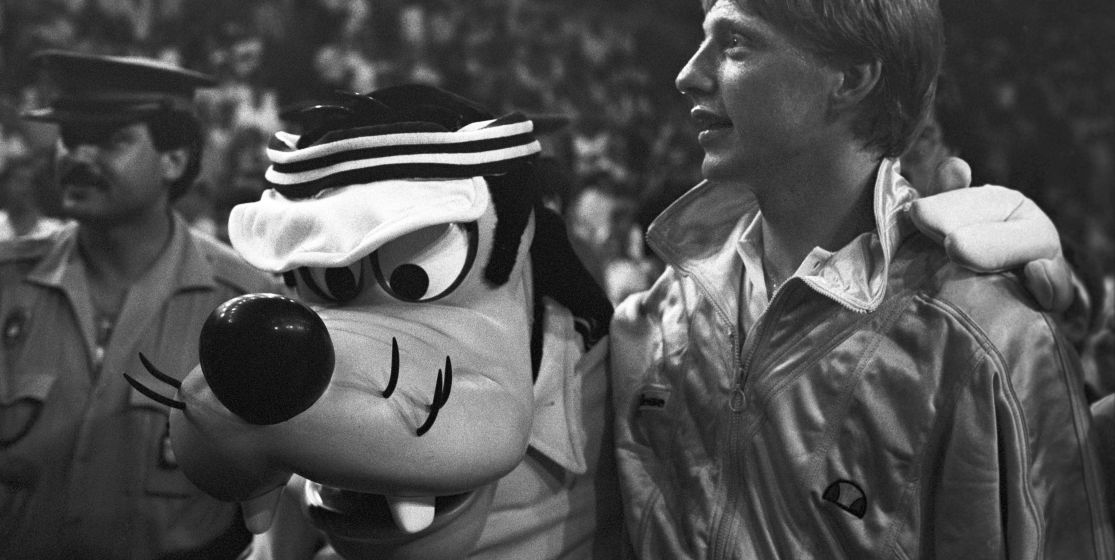- Read more: Top 20 Davis Cup by BNP Paribas players (20th to 11th)
- Read more: Top 20 Davis Cup by BNP Paribas players (10th to 6th)
- Read more: Top 20 Davis Cup by BNP Paribas players (5th and 4th)
1. Because Boris Becker played a big part in making Germany a nation of winners...
... « and at the end, the Germans always win! ». The famous quote was just about football. But with the help of Steffi Graff, Boris Becker imported it in the world of tennis in the second half of the eighties : having been crowned at Wimbledon three times (1985, 1986 et 1989), but also once at the US Open (1989), he was also the leader of the Mannschaft who won the first ever Davis Cup for Germany (1988). In the final (West) Germany dominated Sweden (who had Stefan Edberg and Mats Wilander in the team), 4-1 in Göteborg. A year later in Stuttgart, the same final saw the same team winning, this time 3-2. And at the end, the Germans always win.
2. Because Boris Becker produced two exceptional clean sheets in 1988 and 1989...
…which is certainly one of the most incredible individual performances of this era. A few numbers, maybe? Boris Becker didn’t lose a single match in the singles in his two victorious journeys in 1988 and 1989: 11 wins in 11 matches played, and only 2 sets lost. His record is almost as amazing in the doubles, where, alongside Patrick Kuhnen or Eric Jelen, he won 7 matches in 8 matches played. Becker only lost one match in these two incredible years, in Prague, in April 1989. Playing alongside Jelen, Becker lost the fifth set 6/3 against Petr Korda and Milan Srejber, who were playing together for the first time ever in the Davis Cup.
3. Because Boris Becker produced the lob of the century to get out of a tricky situation against Agassi in 1989...
... during the semi-final Germany-USA played at the Olympia Halle in Munich. The press mentioned a masterpiece, to describe Boris Becker’s turnaround, who won 6/7 6/7 7/6 6/3 6/4, and for the German’s sprint when Andre Agassi served to win the match at 6-5 in the third set. The score was 15-30 when Becker gave everything to transform Agassi’s drop shot into a lob which ended on the baseline: this was the start of BB’s incredible “switch”, and one of his last wins against Agassi. That evening, although he had lost, the American found the trick to return Becker’s canon-serve. “He noticed that when I served, I opened my mouth and my tongue was pointing towards the direction of the serve.”
4. Because Boris Becker played (and won) one of the cult matches of the eighties...
... in Hartford in the middle of the summer of 1987, on July 24th. Even better than the match against Agassi in 1989? Yes! This time, the US had the crazy idea of playing against Germany indoors, and John McEnroe ended up having a bad time. The American tried everything, even volleying Becker’s first serves. Becker admitted afterwards that it “was war on the court.” The score itself was a like western movie, 4/6 15/13 8/10 6/2 6/2 for Becker who, before winning the second set in 2h35, saved five set points on his serve at 10-11. Being a good sport - it happened sometimes! - after his defeat, McEnroe enjoyed the moment: “It’s one of the best tennis matches I’ve ever played.” The official duration of the match is 6h20, 6h38 if you take in account the break between the third and fourth set.
5. Because Boris Becker brought an incredible number of viewers to watch the competition...
... during the semi-final against Czech Republic, at the start of October at the Frankfurt Festhalle. The best audience figures in the history of tennis in Germany, strangely higher than during the 1988 and 1989 finals. The German federation states that there were 25 million viewers watching, almost half of the German population at the time. A score which any boss of any TV channel would dream about today, even if most were disappointed, especially those who couldn’t find a ticket, as the venue could only hold 10 000 spectators per day. According to the German federation, they received 50 000 offers for each day, or 150 000 in total. The president of the federation even said in the November 1985 issue of Tennis Magazine that he even received blank cheques. “I received a letter which said: ‘Send me 10 tickets and write the amount that you want on this cheque’! ”






